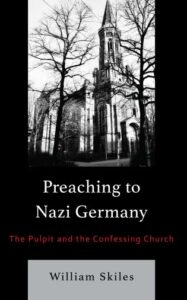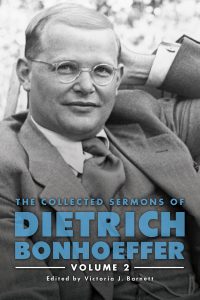Contemporary Church History Quarterly
Volume 30, Number 4 (Winter 2024)
Review of William Skiles, Preaching to Nazi Germany: The Pulpit and the Confessing Church (Lanham: Lexington Books/Fortress Academic, 2023). 293 Pp. ISBN: 9781978700635.
By Jonathan Huener, University of Vermont
Historians of the churches under National Socialism have long been preoccupied by opposition and conformity among pastors and theologians who identified with the Confessing Church. While much of the scholarship has focused on the actions and public statements of Confessing Church leaders in the public arena, William Skiles’ highly readable new monograph is concerned with the ministry of pastors at the parish level. Analyzing more than 900 sermons delivered by ninety-five pastors, Skiles sheds new light on how clergy of the Confessing Church responded to the National Socialist ideology and the regime’s persecutory policies toward its opponents, toward the churches, and toward Jews. While this study conforms to the broader historiographical consensus that the German Protestant churches failed to mount effective opposition or resistance to National Socialism, it also emphasizes that Confessing Church pastors did succeed in articulating, if in non-explicit ways, nonconformity and opposition by characterizing National Socialism as a false and fundamentally anti-Christian ideology, by criticizing the Nazi regime’s persecution of Christians and the German churches, and by challenging Nazi anti-Jewish ideology and policy.
 After setting his agenda in the introductory chapter, Skiles outlines in Chapter 2 the religious conflicts under National Socialism, and more specifically, the division in German Protestantism between the German Christian movement, which sought to align Protestant theology and praxis with Nazi ideology, and the Confessing Church. For Skiles, at the foundation of that conflict was “a profound disagreement about the nature of divine revelation,” (p. 28) with the German Christians claiming to find divine revelation in history, national identity, and racial “science.” By contrast, the Confessing Church, in the spirit of the Reformation, held to the doctrine that knowledge of God is to be found in scripture alone. This chapter provides important context as it guides the reader through some of the early milestones in the regime’s conflict with the Confessing Church: the controversy over the “Aryan Paragraph” of 1933, which excluded clergy of alleged Jewish heritage from the pastorate; the subsequent formation of the Pastors’ Emergency League, which formed the basis for the Confessing Church; and the issuing of the Barmen Declaration in 1934. Skiles also effectively challenges in this chapter two common and simplified interpretations: that the Confessing Church was an anti-Nazi resistance group, and that the Confessing Church’s conflict with the regime was essentially about ecclesiastical freedom.
After setting his agenda in the introductory chapter, Skiles outlines in Chapter 2 the religious conflicts under National Socialism, and more specifically, the division in German Protestantism between the German Christian movement, which sought to align Protestant theology and praxis with Nazi ideology, and the Confessing Church. For Skiles, at the foundation of that conflict was “a profound disagreement about the nature of divine revelation,” (p. 28) with the German Christians claiming to find divine revelation in history, national identity, and racial “science.” By contrast, the Confessing Church, in the spirit of the Reformation, held to the doctrine that knowledge of God is to be found in scripture alone. This chapter provides important context as it guides the reader through some of the early milestones in the regime’s conflict with the Confessing Church: the controversy over the “Aryan Paragraph” of 1933, which excluded clergy of alleged Jewish heritage from the pastorate; the subsequent formation of the Pastors’ Emergency League, which formed the basis for the Confessing Church; and the issuing of the Barmen Declaration in 1934. Skiles also effectively challenges in this chapter two common and simplified interpretations: that the Confessing Church was an anti-Nazi resistance group, and that the Confessing Church’s conflict with the regime was essentially about ecclesiastical freedom.
Chapter 3 accounts for the “historic unmooring” (p. 64) of the Gospel from the scriptures under the influence of the German Christians. For Skiles, the antecedents for this are to be found in the development and traditions of liberal Protestant theology in the nineteenth century. This provides the foundation for Chapter 4, an analysis of the “new school” of homiletics emerging in the early twentieth century. Led by the theologians Karl Barth, Dietrich Bonhoeffer, and others, this trend elevated the importance of preaching, emphasized the authority of scripture, linked homiletics to the sacraments, and affirmed the indispensability and relevance of the Hebrew scriptures. Focusing especially on the writings of Barth, Skiles contends in this chapter that “while the German Christians wished to use the gospel to advance the National Socialist ideology for national and spiritual renewal, Confessing Christians wished to unleash the gospel as a power unto itself [emphasis in original] to achieve spiritual regeneration” (p. 97). While Skiles’ reading of this theological reorientation may be sound, his argument that it “gave Confessing pastors a foothold to express non-conformity and opposition to the German Christian movement and the Nazi regime” (p. 86) remains unconvincing.
Forming the core of Skiles’ study, the next four chapters examine the ways in which Confessing Church pastors voiced in their sermons dissent and opposition to the Nazi regime by challenging its ideology (Chapter 5), its persecution of the churches (Chapter 6), and its antisemitism and persecution of Jews (Chapters 7 and 8). The author is quick to emphasize in Chapter 5 the latitude available to pastors in their preaching, even as he acknowledges that the voicing of dissent or opposition was infrequent and, when it did occur, often implicit and issued “from a posture of obedience to the state” (p. 118). Criticism of the regime was often veiled in the use or aversion of certain words or phrases (e.g., “Bürger” as opposed to “Volksgenosse“), and at times decried National Socialism’s elevation of the “false idols” (p. 129) of nation, race, or Hitler. Skiles also cautions against uncritical acceptance of Dean Stroud’s claim that faithful preaching of the Gospel was, in the context of Nazi Germany, in and of itself an act of resistance,[1] for in this claim Stroud makes a theological assertion rather than posing a sufficient and effective historical argument based on analysis of sources.
As one would expect, pastors and theologians of the Confessing Church also voiced criticism of the Nazi regime’s persecution of Christians and the churches, but again in limited and often implicit ways. They did so by, for example, emphasizing God’s love and justice (in contrast to the obvious injustices of the Nazi state), by relating information about the persecuted (this often accomplished via intercessory prayers), and by invoking God’s judgement on evildoers. It is striking, however, that of the more than 900 sermons analyzed, only thirty-seven condemned the persecution of the churches; and of the ninety-five clergy in Skiles’ sample, only twelve voiced such criticisms, and in so doing only a few were willing to identify the regime in clear terms. Skiles’ numbers regarding Confessing pastors’ criticisms of Nazi policy against Jews, although perhaps not surprising, are equally remarkable: of some 900 sermons analyzed, only sixteen contained criticisms of the persecution of Jews. Skiles considers in Chapter 8 some of the reasons behind this disturbing reality, including Nazi propaganda, concern about the war, a sense of powerlessness vis-a-vis the regime, moral desensitization, antisemitism, and what Peter Fritzsche has described as “general silence” reflecting the German people’s “limits on empathy” (p. 228). The author confronts Confessing pastors’ antisemitism in the preceding chapter, in which he considers the symbiosis between racial prejudice and Christian hostility toward Judaism. Thirty-five of the 900 sermons analyzed contained expressions of anti-Jewish prejudice, and Skiles’ reading reveals that pastors, paradoxically, also made use of conventional anti-Jewish themes and tropes (e.g., the Jews as tribal, the Jews as God-forsaken and cursed, the Jews as idolatrous) to condemn the Nazis and their ideology.
The ninth chapter of this study addresses the efforts of the Nazi Secret State Police (Gestapo) and Security Service (Sicherheitsdienst) to monitor what was said within the walls of churches led by Confessing pastors. The reports of these organizations confirm that pastors did on occasion preach in ways that undermined Nazi ideology and policy, and they reveal the regime’s concern over these sermons. The reports, however, also invite consideration of a broader issue that Skiles raises in this chapter: the problem of reception. How did parishioners apprehend and respond to the rare expressions of dissent or opposition from the pulpit? We lack the sources to respond effectively to that question, and while Skiles’ acknowledges this challenge, he also takes an interpretive leap in asserting that “[c]lergymen’s sermons contributed to a public conversation about the moral nature and truth claims of National Socialism” (p. 242). We do not know how extensive that conversation was; nor is it clear that such a conversation was inspired or influenced by what average Germans experienced in church.
In engaging the theological realm and giving the reader a glimpse into what forms of dissent and opposition occurred within the walls of the church, Skiles accomplishes much in this monograph. Yet questions remain. The author’s source base initially appears extensive, but the number and provenance of the sermons analyzed are not effectively problematized, leaving the reader questioning if some 900 sermons are, in fact, sufficiently representative to support his conclusions. When one considers that some 6,000 pastors were affiliated with the Confessing Church in the early years of the regime, his sample of ninety-five pastors remains troublingly small. Skiles also sets out “to demonstrate the extraordinary possibilities for oppositional preaching in Nazi Germany” (p. 15) via sermons that, he concludes, were “a prominent means by which Confessing Church pastors criticized the regime and its ideology and sought to reorient the perspectives and values of their congregants” (p. 255). But how prominent were the means, and how successfully did pastors reorient the perspectives and values of parishioners? And if the possibilities for oppositional preaching were indeed extraordinary, why did so few pastors avail themselves of such opportunities? Skiles concedes that the vast majority of sermons did not voice opposition, and when they did so, criticism of the regime was seldom explicit. His elevation of the importance of the Confessing Church sermon appears, then, based in hope as much as evidence, for this is as much the story of what was not said from the pulpit, as it is the story of what was.
Notes:
[1] Dean Stroud, ed., Preaching in Hitler’s Shadow: Sermons of Resistance in the Third Reich (Grand Rapids, MI: Wm. B. Eerdmans, 2013).

 Three themes run through these sermons: the seriousness of Bonhoeffer’s Christianity, the insight of his responses to the social and political crises of the late Weimar and Nazi eras, and the resolution of his engagement in the Kirchenkampf (German Church Struggle).
Three themes run through these sermons: the seriousness of Bonhoeffer’s Christianity, the insight of his responses to the social and political crises of the late Weimar and Nazi eras, and the resolution of his engagement in the Kirchenkampf (German Church Struggle).